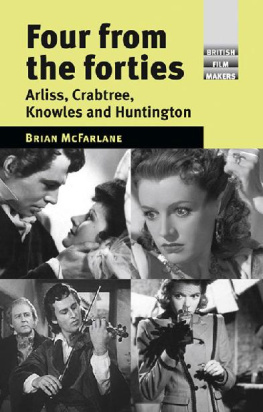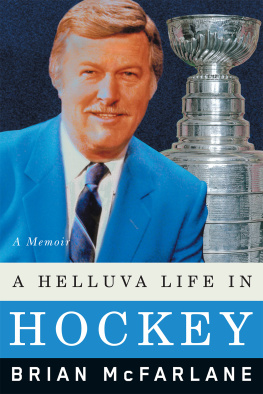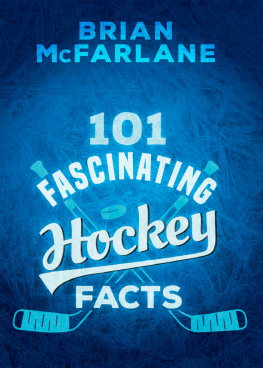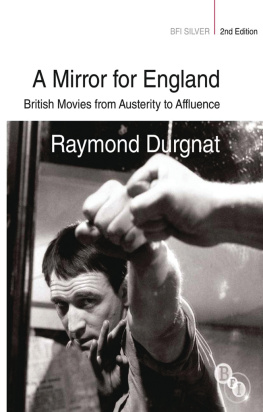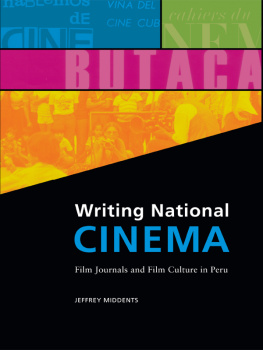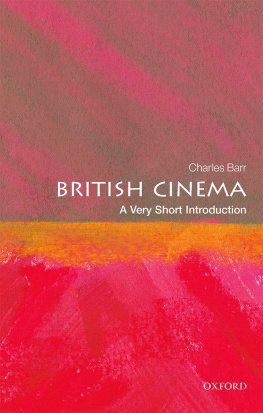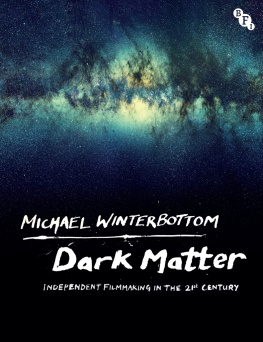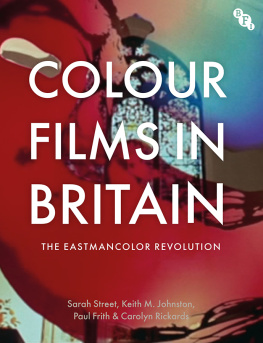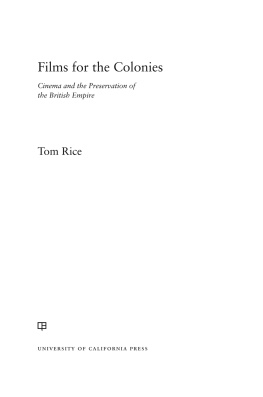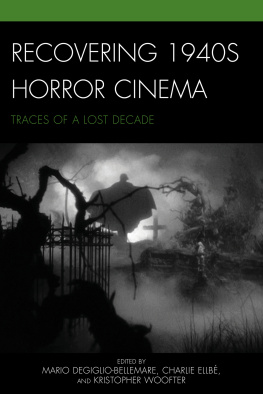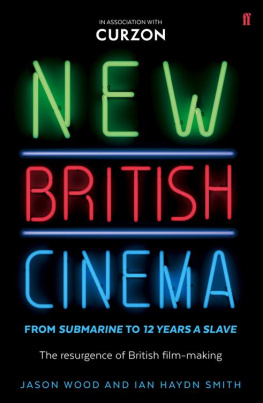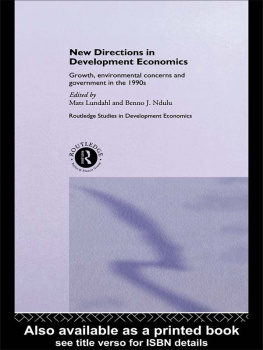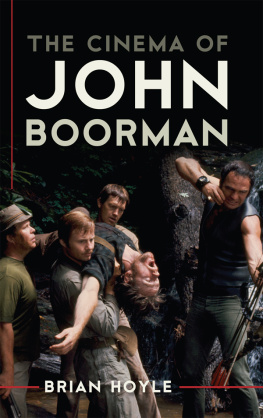BRIAN MCFARLANE, NEIL SINYARD series editors
ALLEN EYLES, SUE HARPER, TIM PULLEINE, JEFFREY RICHARDS, TOM RYALL
series advisers
already published
Lindsay Anderson: Cinema authorship JOHN IZOD, KARL MAGEE, KATHRYN MACKENZIE, ISABELLE GOURDIN-SANGOUARD
Anthony Asquith TOM RYALL
Richard Attenborough SALLY DUX
Roy Ward Baker GEOFF MAYER
Sydney Box ANDREW SPICER
Jack Clayton NEIL SINYARD
Lance Comfort BRIAN MCFARLANE
Terence Davies WENDY EVERETT
Terence Fisher PETER HUTCHINGS
Terry Gilliam PETER MARKS
Derek Jarman ROWLAND WYMER
Humphrey Jennings KEITH BEATTIE
Launder and Gilliat BRUCE BABINGTON
David Lean MELANIE WILLIAMS
Mike Leigh TONY WHITEHEAD
Richard Lester NEIL SINYARD
Joseph Losey COLIN GARDNER
Carol Reed PETER WILLIAM EVANS
Michael Reeves BENJAMIN HALLIGAN
Karel Reisz COLIN GARDNER
Tony Richardson ROBERT SHAIL
J. Lee Thompson STEVE CHIBNALL
Michael Winterbottom BRIAN MCFARLANE AND DEANE WILLIAMS
Four from the forties
Arliss, Crabtree, Knowles and Huntington
Brian McFarlane
Manchester University Press
Copyright Brian McFarlane 2018
The right of Brian McFarlane to be identified as the author of this work has been asserted by him in accordance with the Copyright, Designs and Patents Act 1988.
Published by Manchester University Press
Altrincham Street, Manchester M1 7JA
www.manchesteruniversitypress.co.uk
British Library Cataloguing-in-Publication Data
A catalogue record for this book is available from the British Library
ISBN 978 1 5261 1054 1 hardback
First published 2018
The publisher has no responsibility for the persistence or accuracy of URLs for any external or third-party internet websites referred to in this book, and does not guarantee that any content on such websites is, or will remain, accurate or appropriate.
Typeset
by Toppan Best-set Premedia Limited
For Andrew Spicer, with grateful thanks
Contents
The aim of this series is to present in lively, authoritative volumes a guide to those film-makers who have made British cinema a rewarding but still under-researched branch of world cinema. The intention is to provide books which are up-to-date in terms of information and critical approach, but not bound to any one theoretical methodology. Though all books in the series will have certain elements in common comprehensive filmographies, annotated bibliographies, appropriate illustration the actual critical tools employed will be the responsibility of the individual authors.
Nevertheless, an important recurring element will be a concern for how the oeuvre of each film-maker does or does not fit certain critical and industrial contexts, as well as for the wider social contexts which helped to shape not just that particular film-maker but the course of British cinema at large.
Although the series is director-orientated, the editors believe that reference to a variety of stances and contexts is more likely to reconceptualise and reappraise the phenomenon of British cinema as a complex, shifting field of production. All the texts in the series will engage in detailed discussion of major works of the film-makers involved, but they all consider as well the importance of other key collaborators, of studio organisation, of audience reception, of recurring themes and structures: all those other aspects which go towards the construction of a national cinema.
The series explores and charts a field which is more than ripe for serious excavation. The acknowledged leaders of the field will be reappraised; just as important, though, will be the bringing to light of those who have not so far received any serious attention. They are all part of the very rich texture of British cinema, and it will be the work of this series to give them all their due.
For a great deal of help in giving me access to viewing copies of some of the films I'd had trouble finding and for so much assistance in tracking contemporary critical appraisals of the films of the four directors, I am much indebted to the staff of the British Film Institute, including Jo Botting and Steve Tollervey. At the BFI Library, I am particularly grateful to Ian OSullivan, Sarah Currant, Victoria Crabbe and Adrienne Rashbrook-Coope, who all coped patiently with my technical ineptitude. In Australia, Tom Ryan initiated me into the use of YouTube as a source of rare items, which was very helpful, especially in regard to ancient television episodes. As for my now-fragile copies of Picture Show and Picturegoer , which I have often drawn on for this study, I probably should offer a belated thanks to my late parents for the (meagre) pocket-money that enabled me to buy them and to my dear late wife's tolerance about my storing of these for so many decades. And once again, my thanks to my daughter Sophie for setting me to rights about computer matters and for formatting the book's final manuscript.
Andrew Spicer was enormously helpful in providing copies of key films and the book is dedicated to him with gratitude and affection.
There is nothing new in proposing the 1940s as arguably the enduring high point in the history of British cinema. Books continue to appear about the great names of the period, such as David Lean and Michael Powell; but, as well as the quality cinema associated with these directors, there was also a popular output from film-makers who have not yet been subject to such detailed treatment. There are also excellent books that focus on the period at large, but they are apt to be more concerned with the prestige arm of British film or with thematic concerns.
The purpose of the present book is to draw attention to four directors whose career trajectories had a good deal in common and can tell us much about what British filmgoers were flocking to see in this crucial decade when they were at their most prolific. They are Leslie Arliss, Arthur Crabtree, Bernard Knowles and Lawrence Huntington. All were born at the turn of the century (Arliss in 1901, the other three in 1900); all had been active in a range of film-making functions in the 1930s; and each would do his most proficient and popular work in the 1940s. After that they prolonged their careers, if not their reputations, in B movies, co-features and television, but even in these reduced circumstances their long-honed professionalism would see them through. If none of them hurdled the decade with the comparative ease of their contemporary Lance Comfort, they are all responsible for some of the better moments to be found in the lower depths of post-1940s cinema in Britain. At whatever levels, they all persisted into the 1960s, and to have maintained thirty-year careers in the often crisis-ridden British film industry says something for their persistence and entitles them to a closer examination. Taken together, they may offer a commentary on the changing fortunes of British cinema over the period of their prolificacy and perhaps some insight into why this declined.
These are not biographical studies, but, as well as offering some detailed discussion of their major films, the aim is also to reflect on the contexts in which they operated, contexts both industrial and social, though the emphasis will be on the kinds of preoccupations and dexterity revealed by a close analysis of their films. There will be some account of the involvement of each member of the quartet in the lead-up to his most significant period. It is not intended to offer a detailed account of all the films with which they were associated in the 1930s but, rather, to identify some tendencies in their work that may help to account for their later successes.


